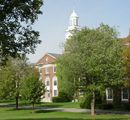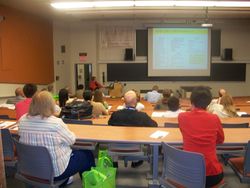Difference between revisions of "Biofuel combustion"
(subst) |
(Add pic) |
||
| Line 1: | Line 1: | ||
{{MainNavigation}} | {{MainNavigation}} | ||
| + | {| align="right" | ||
| + | | __TOC__ | ||
| + | |} | ||
| + | [[File:HopkeSymposiumNERM2010.jpg|left|250px|The Biofuel combustion symposium at NERM 2010]] | ||
| + | <div style="clear:left;"> | ||
==Symposium on Biofuel Combustion for Residential and Commercial Space Heating== | ==Symposium on Biofuel Combustion for Residential and Commercial Space Heating== | ||
There is rapidly growing interest in renewal fuels as a response to climate change and the increasingly competitive price of biomass fuels as oil prices rise. However, conventional biomass combustion systems produce significant quantities of air pollutants that make them undesirable particularly when considering public buildings such as schools. Thus, the [http://www.nyserda.org/ New York State Energy Research and Development Authority (NYSERDA)] has undertaken a large program of examining the performance of new state-of-the-art gasification systems that had been developed in Europe and are now becoming available in the US. Projects have been initiated to examine conventional and advanced boilers and the results of these projects will be presented. In addition, we solicit reports of studies of improved biomass fuel burners that assess the thermal and emission performance or studies of the performance of alternative biomass fuels such as grass or other pellets in advanced boiler applications. | There is rapidly growing interest in renewal fuels as a response to climate change and the increasingly competitive price of biomass fuels as oil prices rise. However, conventional biomass combustion systems produce significant quantities of air pollutants that make them undesirable particularly when considering public buildings such as schools. Thus, the [http://www.nyserda.org/ New York State Energy Research and Development Authority (NYSERDA)] has undertaken a large program of examining the performance of new state-of-the-art gasification systems that had been developed in Europe and are now becoming available in the US. Projects have been initiated to examine conventional and advanced boilers and the results of these projects will be presented. In addition, we solicit reports of studies of improved biomass fuel burners that assess the thermal and emission performance or studies of the performance of alternative biomass fuels such as grass or other pellets in advanced boiler applications. | ||
Latest revision as of 13:37, 12 June 2010
Symposium on Biofuel Combustion for Residential and Commercial Space Heating
There is rapidly growing interest in renewal fuels as a response to climate change and the increasingly competitive price of biomass fuels as oil prices rise. However, conventional biomass combustion systems produce significant quantities of air pollutants that make them undesirable particularly when considering public buildings such as schools. Thus, the New York State Energy Research and Development Authority (NYSERDA) has undertaken a large program of examining the performance of new state-of-the-art gasification systems that had been developed in Europe and are now becoming available in the US. Projects have been initiated to examine conventional and advanced boilers and the results of these projects will be presented. In addition, we solicit reports of studies of improved biomass fuel burners that assess the thermal and emission performance or studies of the performance of alternative biomass fuels such as grass or other pellets in advanced boiler applications.
This session will take place on the afternoon of Thursday, June 3rd in Stowell 211.
Session organizers
Prof. Philip Hopke is Bayard D. Clarkson Distinguished Professor, and the Director of the Center for Air Resources Engineering and Science at Clarkson University, Potsdam, NY. He studies airborne particulate matter.Ellen Burkhard, Ph.D is a Senior Project Manager at the New York State Energy Research and Development Authority {NYSERDA}, responsible for environmental monitoring and evaluation; air quality; energy and environmental performance of biomass combustion technologies.
Confirmed speakers
- Dr. Lisa Rector, Northeast States for Coordinated Air Use Management, Boston, MA: "Comparative Emissions from Boilers <15mmBtu".
- Prof. Monica Mazurek, Rutgers University, Piscataway, NJ: "Assessing biomass smoke emissions using levoglucosan ambient concentrations".
Program
Thursday, June 3, 1:00 PM - 5:40 PM
- Biofuel Combustion
- Stowell 211
Organizer/Presider: Philip Hopke, Ellen Burkhard
1:00 Introductory Remarks
1:05 182 New York Bioenergy. Janet Joseph, New York State Energy Research and Development Authority
1:30 183 NYSERDA Research and Demonstration Program on High-Efficiency Biomass Heating Systems. Ellen J. Burkhard, New York State Energy Research and Development Authority
2:00 184 Comparison of Gas, Oil, Biodiesel, and Wood-Fueled Residential Heating System Emission Characteristics. Thomas Butcher and Roger McDonald, Brookhaven National Laboratory
2:20 185 Comparative Emissions from Boilers <15mmBtu. Lisa Rector, NESCAUM
2:40 186 Assessing Biomass Smoke Emissions Using Levoglucosan Ambient Concentrations. Monica A. Mazurek1, Harmonie A. Hawley1, Min Li8, Steve McDow2, Lee Alter3, John Graham3, Henry Dirk Felton4, Thomas McKenna5, Charles Pietarinen5, Alan Leston6, Steve Bailey6, James Schwab7 and Ken Demerjian7, (1)Rutgers University, (2)National Exposure Research Laboratory, U.S. EPA, (3)Northeast States for Coordinated Air Use Management, (4)New York State Department of Environmental Conservation, (5)New Jersey Department of Environmental Protection, (6)Connecticut Department of Environmental Protection, (7)University at Albany - State University of NY, (8)California University of Pennsylvania, (9)Center for Advanced Infrastructure & Transportation
3:00 187 Energy and Emissions Performance of Residential and Small Scale Commercial Wood Boilers in Europe and the US. Nathan Russell and Ellen Burkhard, NYSERDA
3:20 Intermission
3:40 188 Reducing Emissions from Wood Chip and Wood Pellet Boilers through System Design and Operational Optimization: Lessons from Europe and the USA. David Dungate, ACT Bioenergy, LLC
4:00 189 Performance Evaluation of High Efficiency Wood Boiler. Sriraam Ramanathan Chandrasekaran, James Laing, Suresh Raja, Thomas M. Holsen and Philip K. Hopke, Clarkson university
4:20 190 Performance Evaluation of a Model Electrostatic Precipitator for an Advanced Wood Combustion (AWC) System. Mark Omara, Philip K. Hopke, Suresh Raja and Thomas M. Holsen, Clarkson University
4:40 191 Characterization of Mercury Emissions from Domestic Wood Combustion. Jiaoyan Huang1,2, James Laing2,3, Tiffany Basara2, Philip Hopke2,3 and Thomas Holsen1,2,3, (1)Clarkson University, (2)Clarkson Univeristy, (3)Clarkson University
5:00 192 Feasibility of Grass Pellet Combustion for Residential Heating. Jerome H. Cherney, Cornell University
5:20 Symposium Wrap-up and Policy Implications.


